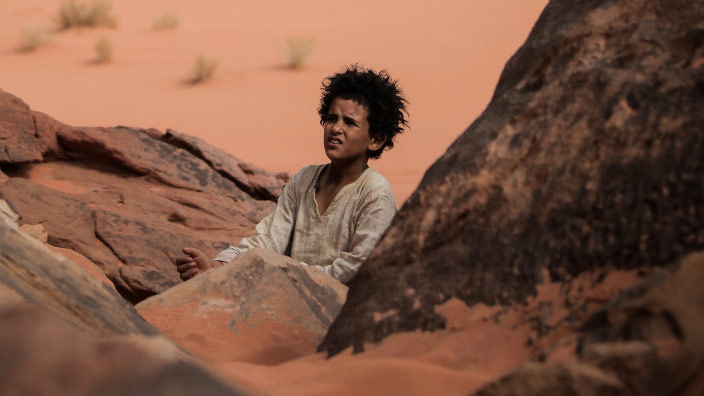The film begins with our young hero Theeb (Jacir Eid Al-Hwietat) knocking around with an older man who seems to be his father, but turns out to be an older brother who has stepped into a paternal role following the death of their father. They fetch water for the camels (important to the story, as are the wells). His brother Hussein (Hussein Salameh Al-Sweilhiyeen) then shows him how to aim a rifle and tells Theeb that he will be ready for bullets when he can aim straight. The ‘boy on the cusp of manhood’ tale has been done plenty of times and usually without much deviation from the familiar beats. That night, two mysterious strangers arrive to the boys’ tribe ,one of them an Englishman in uniform (Jack Fox). They are greeted warmly by the tribe and they conduct the formal pleasantries in an unhurried style. This benefits the film as we get to know the characters a little bit more than we would usually without the need for a large amount of exposition.”
Theeb’s brother is charged with guiding the Englishman and his Arab agent through a particularly dangerous part of the desert for a clandestine meeting. Also along for the ride in the role of MacGuffin, and invested with quiet menace, is a mysterious box which is in the possession of the Englishman. Will this have significance at some point later on in the film? There is more than a whiff of Lawrence of Arabia in this tale of a young boy (Al-Hwietat excels in the title role) in the Arabian Peninsula during the First World War. But Theeb is a more low-key affair, save for the excellent cinematography of Wolfgang Thaler, who uses the camera superbly. It moves with a quiet rhythm tracking a step behind the characters as they journey into the desert. We see the unfolding story mostly from Theeb’s point of view, a view which is sometimes obscured by other people. He never really has the knowledge needed to completely understand what the men are talking about and how important it is.
Theeb is a curious film. It has been described in some parts as a Bedouin western; while some of the themes play out in similar ways, this isn’t quite accurate. Theeb mixes history, war and politics into the story (A description that makes it sound like a really quiet version of The Good, The Bad and The Ugly, but we’re not quite at that level) to mostly good effect but sometimes it all becomes muddled. There is a terrifically-staged action sequence in the middle of the film that is anything but flashy. Director Naji Abu Nowar grounds the action to fit with the tone of the film and the sequence is tension filled and drawn out in excellent style.
Later in the film the ‘Iron Donkey trail’ (the railroad) is seen and we see that technology has robbed the Bedouin of their livelihood as pilgrim guides. The journey that takes a month by camel now takes just a week by train. Some guides have become highwaymen and violence has become more commonplace. There is a very subtle (if there at all, it may just be this writer) point here in that the very technology and skills that built the railroads will nearly a century later return in the form of drones to destroy the people in these lands. History informs, but mostly in hindsight. The ending of the film is perhaps inevitable due to those pesky story beats. When there are just men around violence ensues. True enough, but we have seen this many times.
So what are to make of this film? English born filmmaker Abu Nowar has fashion a slow-moving film that is beautifully shot with a fine mostly non-professional cast. For a film with so many opportunities for panoramic vistas it is surprisingly intimate and unhurried. Yet, it feels a little predictable and in the end too inconsequential to be truly excellent. It is a fine film, old-fashioned and well told, but aside from its beauty you may find yourself struggling to recall most of it a little while later. But there is enough here to make this reviewer see whatever Abu Nowar does next.

